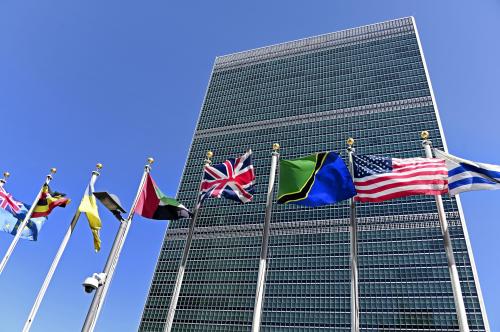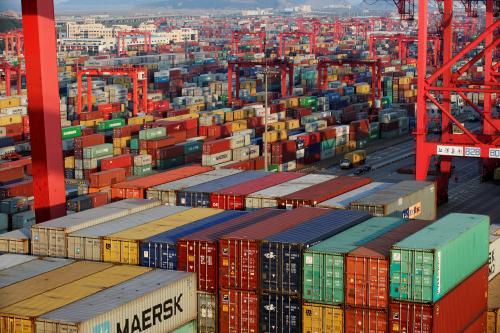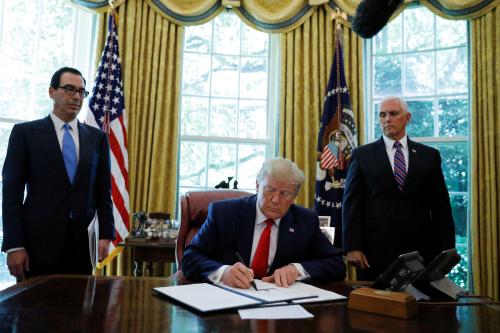President Barack Obama comes to New York this week to visit the United Nations. He will address the General Assembly, meet with Asian leaders, and participate in a clutch of meetings on issues concerning the international community, including development and the situation in Sudan. His trip coincides with the annual meeting of the Clinton Global Initiative, at which the great and the good pledge to help address international problems.
But if his work in New York this week throws light on his approach to international affairs, so does the work he did in Chicago back in the day. What he presents to his fellow world leaders this week — a progressive foreign policy, a willingness to engage with adversaries, a commitment to following the rules and making others do the same — reflects his background as a community organizer.
The foreign policy styles of presidents sometimes show traces of their previous careers. Former actor Ronald Reagan liked a simple plot and a few good lines. Bill Clinton displayed a lawyer’s fondness for arguing both sides of an issue. George W. Bush, former managing partner of the Texas Rangers, believed that changing a single regime could solve the problems of the Middle East, just as a single hit can win a game of baseball.
Barack Obama often relates how after college he became a community organizer on the South Side of Chicago. Community organizing is a social movement pioneered by activist Saul Alinsky which mobilizes communities to work together to improve their circumstances.
As president, Obama is trying to become an international community organizer.
There are some immediate objections to this comparison. Community organizing is about domestic policy, not foreign policy. It is a tool for the powerless, yet the White House is a global center of power. Community organizers usually take a confrontational approach and get in their opponents’ faces; Obama does not. Community organizing handbooks say that things should be run by local networks, not charismatic outsiders like Obama, with his soaring speeches to mass rallies.
Nevertheless, the parallels are strong. First, community organizing is a fundamentally progressive enterprise concerned with bringing about change. There is a strong progressive streak in Obama’s foreign policy, seen most powerfully in his signature initiative to reduce global stockpiles of nuclear weapons.
Second, community organizers are preoccupied with power. They don’t aspire to the purity of the impotent. They identify who holds power, and they set out to engage them.
As president, Obama has engaged with all sorts of troublesome regimes. He shook hands with Venezuela’s Hugo Chavez and pressed the reset button on America’s relations with Russia. He was slow to stand up for protestors in Tehran and to meet with the Dalai Lama, in order to better engage with Iran and China. He set aside the freedom agenda of the right and the human rights agenda of the left, and has earned their criticism for it. In his Nobel Peace Prize lecture, he gave a community organizer’s world-weary response: “I know that engagement with repressive regimes lacks the satisfying purity of indignation.”
Community organizers will engage anyone if it furthers the interests of the community. This tough-minded focus on interests is the final bridge between the two ends of Obama’s life.
In 1988, a young Obama wrote that the task for community organizers is to “knit together the diverse interests” and thereby “shape a sense of community not only for others, but for themselves.”
This same theme emerges in Obama’s most important foreign policy statements. In his Nobel lecture, he accepted that the United States must restrain its own power and abide by international standards of conduct. Americans cannot “insist that others follow the rules of the road if we refuse to follow them ourselves.” A community only holds together if everyone follows the rules.
Yet there is a flipside to this principle, as he explained at the United Nations last year: “Those who used to chastise America for acting alone in the world cannot now stand by and wait for America to solve the world’s problems alone.” When a state shrugs off efforts at engagement and breaches the rules, the community must be tough in enforcing them.
Obama is trying to organize a community of like-minded nations who are prepared to act in areas where their interests overlap – even where that action comes at the price of, say, trade lost with Iran, or lives lost in Afghanistan. “Those regimes that break the rules must be held accountable… Intransigence must be met with increased pressure – and such pressure exists only when the world stands together as one.”
Obama’s foreign policy attracts criticisms that closely track those leveled at community organizing. Just as Margaret Thatcher said “there is no such thing as society,” so John Bolton claims “there is no such thing as the United Nations”. There is no meaningful international community, they argue, and endless apologizing and philosophizing won’t bring one into being.
Yet what is the alternative to international community organizing? The Bush presidency revealed the limits to America’s power when it acted alone.
Many years ago, Obama explained why he agreed to become a community organizer given that the pay is low, the hours long, and the appreciation minimal. His answer then applies equally to international community organizing now on issues such as nuclear weapons, Afghanistan, and Iran:
“It needs to be done, and not enough folks are doing it.”



Commentary
Op-edThe World’s Community Organizer
September 18, 2010